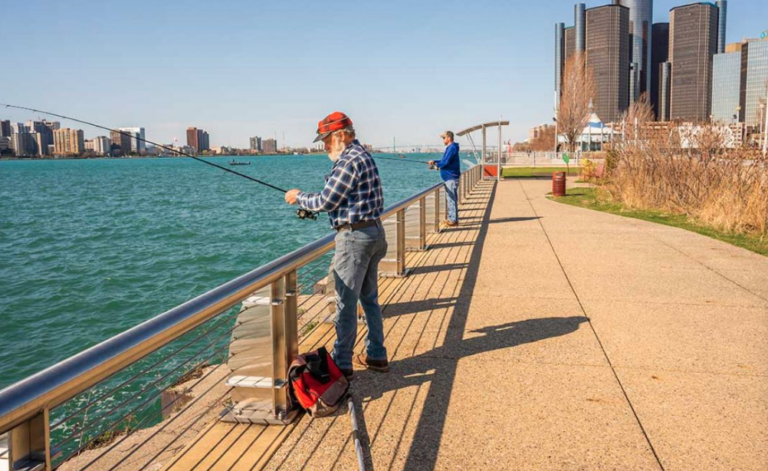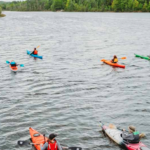
- Kim Kisner
- Business
- 12/27/2022
Brad Garmon, Dir. of the Michigan Office of Outdoor Recreation Industry, MEDC, Shows how SE Mi Outdoor Rec is One of the Best Places for Entrepreneurship and VC

With 36,000 miles of rivers and streams, 20.3 million acres of forests, 1,300 miles of designated mountain bike and bicycle trails, 6,500 miles of snowmobile trails, and more than 600 campgrounds, Michigan has a lot to offer in the way of outdoor recreation.
These resources provide connections with nature and opportunities for a healthier lifestyle, and they support Michigan’s economic growth with more than 7,000 outdoor recreation industry companies that include manufacturers and retail and service-sector businesses.
And the goal is to continue growing.
“When you put Michigan’s outdoor rec growth stats next to the fact that Southeast Michigan is one of the best places for entrepreneurship and venture capital, it becomes about how do we exemplify this and amplify it and bring and support talent here toward even more growth,” said Brad Garmon, director of the Michigan Office of Outdoor Recreation Industry of the Michigan Economic Development Corp.
Gov. Gretchen Whitmer created the office in 2019 to focus on the outdoor economy, and the same year, the state joined the Confluence of States (COS), a bipartisan coalition of states dedicated to cultivating strong outdoor recreational economies while preserving land and other natural resources.

Garmon, the coalition’s incoming chair for 2023, said the coalition’s four areas of focus align with Michigan’s goals of developing a sustainable future: Economic development, workforce and education, public health and wellness, and conservation and stewardship.
“There is inherent connectivity between the outdoor recreation industry and building a sustainable future – a sustainable Michigan,” Garmon said. “We are leaning into the four COS areas of focus to create jobs, strengthen the economy, and promote physical activity while also being stewards of our wetlands, waters, forests, trails, parks, and natural resources.”
The added infrastructure points to the growth in the outdoor recreation economy.
According to the Michigan Economic Development Corp. and the U.S. Bureau of Economic Analysis:
- Michigan’s outdoor recreation economy grew 15.4% from 2020 to 2021 and is up 30 percent since 2012.
- The outdoor recreation industry employs nearly 110,000 people in a wide range of occupations and skills, including design and manufacturing, retail sales, and hospitality, accounting for $5 billion in wages and salaries.
- More than 7,200 of Michigan’s outdoor recreation jobs are in manufacturing, such as boating, RV, and gear manufacturing.
- The outdoor recreation economy also impacts local retailers across the state to the tune of $3.5 billion, accounting for 32% of the total value-add impact. Retail jobs supporting outdoor recreation totaled over 41,000 in 2021. The value-add is the difference between sales receipts plus other operating income and inventory change and production costs.
And more growth is the plan.

“We are working on identifying how we can add jobs, and also bring companies in from out of state,” Garmon said.
He points to the bike industry as an example, saying, “I attended a bike industry summit recently and a large area of discussion focused on the fact that manufacturing is mostly overseas, and that the legacy of bicycle production in the U.S. has been lost. By pointing them to the manufacturing and engineering expertise in Michigan this creates a pathway for opportunity and a win/win for all.”
Another area of interest for Michigan is the electrification of motor sports vehicles.
“This industry is looking at and thinking about an electric future now, and our innovation in this area could bring big opportunities and more business,” Garmon said.
Given that Michigan is also being recognized as a destination for startups and venture capital investment, the implication of opportunity gets even stronger. In fact, Detroit is the No. 1 emerging startup ecosystem globally, according to newly released rankings from Startup Genome’s 2022 Global Startup Ecosystem Report (GSER).
When you consider that Detroit has also been recognized as one of the best travel destinations in the world, one of Time’s ‘Worlds’ Greatest Places’, and the Riverwalk is consistently voted best in the America, Detroit becomes even more interesting.
Garmon shares,
There is this antiquated idea that recreation only happens in wild or natural places, but Detroit is demonstrating that recreation happens everywhere. The Dequindre Cut, Belle Isle, the Riverwalk, and our parks all support quality of life and activity and recreation in Detroit.
He added: “You don’t have to be on a trail or working in the wilderness to apply work skills and/or enjoy life. We are getting better at telling Detroit’s story and talking about Michigan’s assets and not living in the shadows of places like Colorado – we are now standing right next to them.”
Be sure to subscribe to our newsletter for regular updates on sustainable business practices in and around Detroit.
Kim Kisner
- All
- Business
- Community
- Education
- Events

Unique Monique Scented Candles, a Detroit-based business founded by Monique Bounds., aims to produce candles and household products with clean ingredients and local supply chains. What began as a personal hobby during college has evolved into a full-time venture producing coconut oil and soy-based candles made with essential oils and locally sourced materials. SBN Detroit interviewed Bounds about launching a sustainable product line, sourcing challenges in Michigan, and...

Eastern Market Partnership, in collaboration with the City of Detroit’s Office of Sustainability Urban Agriculture Division, has announced $240,000 in grant funding to support Detroit-based farmers and farmer collectives. The grants will advance food access, climate education, sustainable land use, and economic opportunity, with priority given to Black- and Indigenous-led farms, youth-led initiatives, and projects rooted in historically disinvested neighborhoods. The recipients – ranging from cooperatives and community...

Citizen Robotics is a Detroit-based nonprofit that advances the use of robotics and digital manufacturing in residential construction, focusing on improving productivity, sustainability, and long-term affordability. Best known for its early work in 3D-printed housing, it explores how alternative construction methods and new financial models can reduce material waste, lower lifetime operating costs, and enhance the resilience of homes. SBN Detroit interviewed Tom Woodman, founder and president of...







